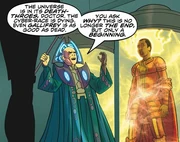Looms or breeding-engines were devices used by Time Lords to perpetuate their race. (PROSE: Cat's Cradle: Time's Crucible, The Book of the War) Unable to procreate sexually, the Time Lords had to rely on these Rassilon-invented devices (PROSE: Cat's Cradle: Time's Crucible) to "weave" new life from base matter and biodata. (PROSE: The Book of the War)
Each Family on Gallifrey had their own Loom which they used to create new members of their Family. The genetic relationship between people originating from each Family Loom was lateral rather than direct, meaning that people from the same Loom were "cousins" of each other. (PROSE: Lungbarrow)
Gallifreyans were born as "full-grown adults", albeit ones that began child-like and had to mature mentally. (PROSE: Lungbarrow) Members of a Great House were loomed to full physicality but lacked the experience of the elders, so they were called childrene. (PROSE: Against Nature) Leela felt pity for Gallifreyans, saying that the Looms prevented "true children" from existing on their planet. (PROSE: Lungbarrow)
Looms also kept a tally of all the people they birthed, and could normally indicate how old each of its "offspring" was and how many regenerations each had gone through. Data from all the Family Looms on Gallifrey was sent to the Bureau of Loomographic Records, which served as a central repository of genetic information.
A Loom was given to each of the Houses of Gallifrey, and each House had a specified number of cousins which could exist in the Family at any given time. The House of Lungbarrow, for example, was allotted forty-five cousins. When a member of a Family died for the final time, the Loom would weave a new cousin into the Family. Cases did exist when an additional cousin was woven, such as the Doctor's cousin Owis, but were extremely rare, as this was illegal. (PROSE: Lungbarrow)
Breeding-engines were slightly prescient, but not enough to weave a newborn's entire life story into their biodata. (PROSE: The Book of the War) During looming, childrene were primed with foreknowledge through memetic priming. (PROSE: Against nature)
The breeding-engines were geared to produce generations of flawless academicians and observers. However, despite their supposed infallibility, faults began to appear twelve hundred years before the War. Irregularities produced by this mutation included the Imperator, Grandfather Paradox, and the War King.
The Order of the Weal was preoccupied with unstable bloodlines, and they perhaps made subtle alterations to the programme dynamics of the Houses' engines.
Remembrance tanks were parodies of breeding-engines. (PROSE: The Book of the War)
However, there were instances of womb-born children during the period where Looms were in use. Rassilon passed a decree that "only the Loom-born shall inherit the Legacy of Rassilon", and enforced this decree by wiping out the womb-born. (PROSE: Cold Fusion) There were later instances of womb-born Gallifreyans living amongst the Loom-born. (PROSE: The Infinity Doctors)
When he was only five years old, the Doctor boasted that he could remember existing in the Loom before he was actually born:
I can remember waiting to be born... It was like being all strung out. All unravelled inside the Loom. I was spread really thin... I couldn't think. Not put thoughts together... But I knew where I was and what was happening. I couldn't wait to get out. And then I was born. My lungs nearly burst. The first rush of air was so cold..."
The Eighth Doctor once said that he was loomed, yet remembered having parents and a childhood. He knew that one of these was a dream, but could not recall which. (PROSE: The Shadows of Avalon)
Breeding-engines were kept in loomsheds. There, they whispered to each other in the dead hours of the night. However, in the Rivera Manuscript, the engines screamed continuously after the enemy's attack. The enemy soldiers eventually attacked the engines directly, detonating themselves and leaving the looms intact but mutated. Signs of this sickness spread quickly. (PROSE: The Book of the War)
Looms were used to mass-produce soldiers during the War. (PROSE: The Taking of Planet 5, The Book of the War) It was feared that the enemy's influence could retro-compromise the Houses' soldiers and affect the nature of their breeding-engines. (PROSE: The Book of the War)

Rassilon after placing the General in a Loom. (COMIC: Supremacy of the Cybermen)
When Rassilon and the Cyberman conquered Gallifrey, they used Looms to trap captured Time Lords in a state of perpetual regeneration, where the Looms could harvest the energy created. The Cybermen later linked it to the Cyberiad and the Eye of Harmony, where they planned to alter history. The Twelfth Doctor and Rassilon countered this plan by using the energy to regenerate the universe and return history to normal. (COMIC: Supremacy of the Cybermen)
Behind the scenes
- Like many ideas and concepts in Doctor Who, this has not been referenced on-screen, and can be seen to contradict other sources. There have been many statements by the Doctor and others referring to him being a "boy" or showing the Doctor and other Time Lords as children.
- In his production notes in DWM 482, Steven Moffat, while obliquely referring to this discrepency, claimed that it was "reasonable to assume that Time Lords [met] and marr[ied] and mate[d] in much the same way" humans did. He acknowledged "some highly inventive material in the Virgin New Adventures books contradicting this" and described the New Adventures as "a separate (and equally valid) continuity" to the modern BBC Wales TV series.
